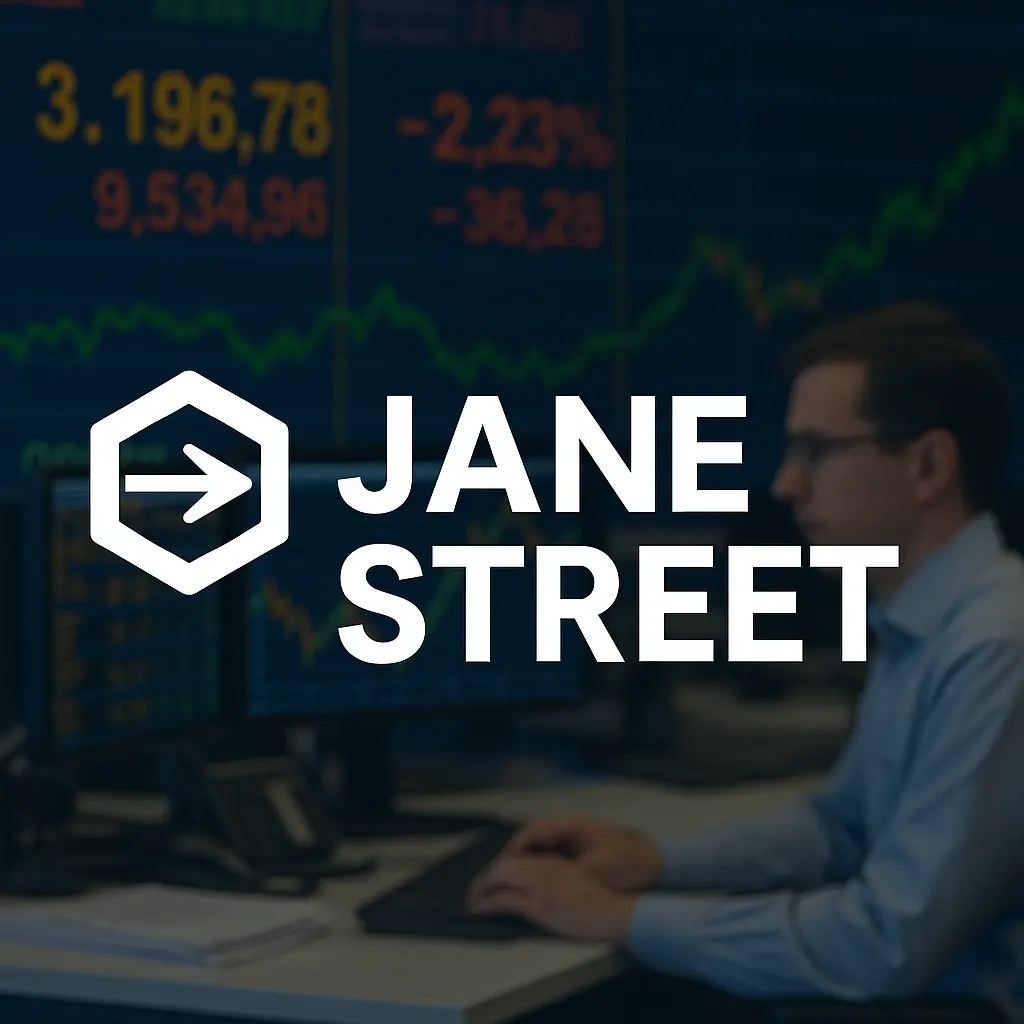From secretive quants to global controversy—how Jane Street quietly became one of the most powerful forces in finance and what its future in India now looks like.
Table of Contents
ToggleWhat is Jane Street? The Company Everyone in Finance Talks About—But Few Understand
Jane Street isn’t your typical Wall Street firm. With no public-facing CEO, no flashy advertising, and no outside clients, it operates in near-total secrecy—yet moves trillions of dollars each year across global markets. Founded in 2000 in New York, Jane Street Capital is a proprietary trading firm and global liquidity provider that uses mathematics, data science, and software engineering to make money from tiny price differences in financial instruments.
Unlike hedge funds that manage other people’s money, Jane Street trades using its own capital—meaning it profits only if it outsmarts the market.
Where It Operates:
Jane Street’s footprint spans the financial world. With major offices in New York, London, Hong Kong, Singapore, and Amsterdam, the company trades across:
- Equities
- Bonds
- Options
- Commodities
- Currencies
- Exchange-Traded Funds (ETFs)
Its trading is lightning-fast and data-driven, powered by advanced algorithms and a proprietary software infrastructure—mostly written in the programming language OCaml, a favorite in mathematical research.
Leadership and Company Structure: No CEO, No Problem:
One of the most unusual things about Jane Street is its leadership model. It has no single CEO. Instead, it runs on a flat, partner-led structure, where senior leaders collectively make decisions. This model encourages internal collaboration and accountability—perfect for a company that lives and dies by precision.
Employees are expected to take initiative, challenge assumptions, and constantly run “post-mortems” on failed ideas to refine their strategies.
Financial Performance: Where Numbers Do the Talking:
Jane Street doesn’t publish quarterly reports like public companies, but leaks and regulatory filings show it’s enormously profitable.
🧾 Financial Highlights
| 📊 Year | 💰 Revenue | 💵 Profit |
|---|---|---|
| 2020 | $6.3 Billion | ~$5 Billion |
| 2023 | $10.6 Billion | $7.4 Billion |
| 2024 (UK Unit) | — | £918 Million (UK alone) |
It processes over $20 billion in trades daily, making it one of the largest players in global ETF markets and options trading.
Culture and Work Environment: For the World’s Sharpest Minds:
Jane Street is notorious for paying huge salaries—but it doesn’t hire just anyone. The firm hires from elite mathematics, physics, and computer science backgrounds and often attracts Olympiad winners, Ivy League graduates, and PhDs.
- Interns can earn up to $250,000 for a summer.
- New traders start at over $300,000 per year.
- Software developers often exceed $400,000 with bonuses.
Work culture emphasizes collaboration over ego, and decisions are often made via group consensus. That’s how they keep their risk low and performance high.
What Makes Jane Street Different:
| 🧠 Area | 🌟 What Sets It Apart |
|---|---|
| Technology | Builds all tools in-house using OCaml |
| Risk Management | Known for ultra-precise hedging |
| Ethics | Zero outside clients = fewer conflicts of interest |
| Innovation | Deep use of machine learning and data modeling |
| Flat Hierarchy | No corporate ladders or traditional management |
Legal Controversies and Global Scrutiny:
Despite its low profile, Jane Street has found itself in headlines for several legal battles:
- India (2025): SEBI barred Jane Street and froze ₹4,840 crore in connection with alleged index manipulation on expiry days. This case sent shockwaves across Indian stock markets, dragging down BSE and brokerage stocks like Angel One and Nuvama.
- USA (2024): Filed a lawsuit against Millennium Management for allegedly copying Jane Street’s proprietary options strategy.
- South Sudan (2023): A cofounder, Donald Sussman, faced allegations of indirectly funding weapon deals—though Jane Street denied any involvement.
Jane Street in India: What You Need to Know:
Jane Street had been a major Foreign Portfolio Investor (FPI) in India’s fast-growing derivatives market. It leveraged the Bank Nifty and Nifty 50 index options to execute high-frequency trading strategies.
SEBI’s interim order in July 2025 accuses the firm of manipulating index settlement prices by placing strategic orders in the last seconds of trading—impacting millions of retail investors.
This is the first time SEBI has issued a ban with such a large escrow condition, freezing over ₹4,800 crore in assets.
🔐 Escrow Order Summary
| 🔒 Directive | 📌 Details |
|---|---|
| Ban Duration | Until final investigation |
| Amount Frozen | ₹4,840 crore (~$570 million) |
| Trading Status | Barred from Indian markets |
| Appeal Options | Can challenge in SAT (Securities Tribunal) |
What This All Means for Markets & Traders:
Jane Street’s case is not just about one firm—it’s about how advanced quant firms are pushing the limits of what’s legal in high-speed markets. For Indian regulators and investors, it’s a wake-up call to tighten rules, add tech-driven oversight, and protect market integrity.
For global firms, it’s a warning: India is no longer a soft regulatory playground.
🌐 Official Sources:
Jane Street has built a reputation as a math-first, code-heavy, ultra-private empire in global finance. It’s brilliant, fast, and often too smart for its own good. But with regulators now zooming in, especially in emerging markets like India, the age of unchecked high-frequency trading may be entering a new, more accountable era.
One thing’s certain: Jane Street’s next moves will be watched like never before.













